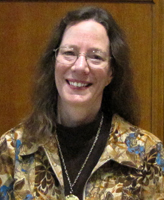
Laura Dassow Walls, a distinguished scholar of 19th century American literature and culture, will join the Notre Dame faculty in fall 2011 as the William P. and Hazel B. White Professor of English.
Her latest book, The Passage to Cosmos: Alexander von Humboldt and the Shaping of America (University of Chicago Press), recently won the Modern Language Association’s James Russell Lowell Prize, the Organization of American Historians’ Merle Curti Award for the best book in American intellectual history, and the Michelle Kendrick Memorial Book Prize from the Society for Literature, Science, and the Arts.
“This unprecedented conjunction of awards speaks to both the excellence of Laura Walls’s work and its profound interdisciplinarity,” says John Sitter, professor and chair of the Department of English. “We are pleased to have her join us here at Notre Dame.”
The Transcendentalists
Currently the John H. Bennett, Jr., Professor of Southern Letters at the University of South Carolina, Walls specializes in American Transcendentalism—especially Henry David Thoreau and Ralph Waldo Emerson, transatlantic romanticism, literature and science, and environmental literature and ecocriticism.
She has written two other books—Seeing New Worlds: Henry David Thoreau and Nineteenth-Century Natural Science and Emerson’s Life in Science: The Culture of Truth—and edited three, including The Oxford Handbook of Transcendentalism, published in 2010. In addition, she edits the annual journal The Concord Saunterer: A Journal of Thoreau Studies.
Walls’ current projects include a biography, Writing the Cosmos: The Life of Henry D. Thoreau, for which she was awarded a 2010-11 Guggenheim Fellowship, and research for an essay on Louisa May Alcott, who was one of Thoreau’s pupils.
“The context that interests me most right now is cosmopolitanism,” Walls says. “We think of the Transcendentalists as American nationalist writers, but they thought of themselves as part of a world movement for universal human rights and integrated this into literature, educational reform, the sciences, and religious questions—how to revive religion and try to make it a kind of living reality when many of them thought it was turning into dead dogma.”
Literature and Science
Walls has also long been fascinated by the history and literature of science, and was even planning to become a scientist when she began her undergraduate career.
“I realized I didn’t want to be a scientist—I wanted to think about science,” she says. “To work on the humanities side is for some of us the right place to ask these layered and complex questions. So I ended up in an English department, but I am often drawn back to science writing. The result is I’m always interested in finding ways to heal the breach between the humanities and the sciences.”
As a scholar, Walls has taken a special interest in the scientific writings of Thoreau and his contemporaries, many of which had previously been ignored, and she explores texts written by scientists during the same time period.
“The separation of literature from science hobbles our understanding of both by buying into modernist ideologies that write science out of culture and nature out of literature,” she says.
Interdisciplinary Collaboration
At Notre Dame, excitement about Walls’ appointment extends well beyond the Department of English.
“With Laura Walls’s decision to move to Notre Dame, we find ourselves now with the greatest concentration of expertise in literature and science of any university in North America,” says Don Howard, a professor of philosophy and director of Notre Dame’s History and Philosophy of Science graduate program. “This new area of excellence nicely complements Notre Dame’s existing strengths, and we look forward to exploring innovative ways to turn this to advantage programmatically. For those of us in HPS, the appointment of Walls is like manna from heaven.”
For Walls, Notre Dame is also the right place at the right time.
“I think we’re just at a fragile and important moment,” she says. “The shape of the world is changing. We need to make sure the humanities in particular are a true voice in this moment. At Notre Dame, I felt like the people I was speaking with understood exactly what I was saying, and to come here means joining a community that shares this same sense.”
Walls succeeds Gerald Bruns, the inaugural William P. and Hazel B. White Professor of English, who retired from Notre Dame in 2008.


